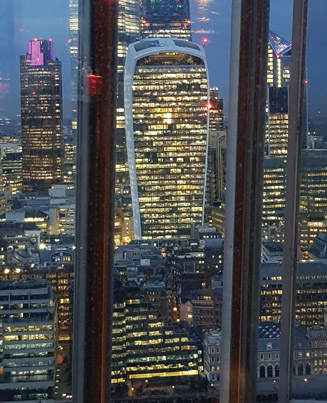One of the outstanding features of the Covid-19 lockdown has been the regular afternoon webinars by Prof Martin Gill, who with international security industry figures has debated security management questions, writes Mark Rowe.
The 24th seminar, on June 16, was with Sandi Davies, USA-based Executive Director at the webinar’s sponsor IFPO, the International Foundation for Protection Officers; Joop Verdonk – Managing Director at European Security Academy (Netherlands), and two heads of ACS Pacesetters guarding companies: David Ward, CEO of Ward Security; and Joachim Ritter, Chairman of Interr.
To introduce their topic; the security officer’s job has become more complex – with time and attendance software, facial recognition, spreadsheets, even drones and robots; all as things to give a better product to the client; and give a guard a more interesting job. An app for reporting an incident on your phone in 30 seconds save writing a report. One question the panel chewed over was; does technology enhance what the security officer does, or replace him or her? Joachim Ritter of Interr felt that human to human interaction can’t be replaced. “We try and find the best of both worlds,” he said, meaning the human interaction, and tech.
Ultimately, Sandi Davies argued, better educated officers are required; not only as first responders, but as officers are tasked with more and more things. Without properly trained security officers, she pointed out, money spent on tech is often wasted because officers can’t use it to its utmost. But, officers may be sent out with little or no knowledge of their tasks; and set up to fail. Unfortunately, officers may be made the scapegoat, when any inadequacies are a reflection on their leaders. Technology is only as good as the person that uses it; and can be hacked; and if the power goes down, ‘you are flying blind’.
Joachim Ritter recalled he was 19 when he was first in London, as a guard, “and the pay then was approximately 20 per cent lower than the pay now.” He made an interesting comparison with a waiter or coffee shop worker; whereas a waiter can get paid as much as a guard, the guard needs to have an SIA licence, and has to take on more responsibilities. Joachim said: “When we have a client that has a need for a highly-skilled person, we can command a better wage for that guard. If they are there to do an intricate or complex task, we can ask for more pay.”
In David Ward’s opinion, tech is to assist, not to replace. “I see technology as a tool,” he said, “to assist the officer in doing their role, be it a facial recognition camera, a knife arch, or whatever; it’s still the officer that steps forward to interject.”
Another long-running question for the security contractor is whether extending the function – such as requiring the night security officer at a quiet time to refill the coffee machine – debases the role, and dilutes the professionalism. It does happen, as Joachim Ritter said. He raised the word risk – ‘as long as the word risk is part of it, we have some responsibility to adapt’. He gave 9-11 as an example of the counter-terrorism risk, which taken up by security officers did not debase the job; likewise, the Covid-19 virus is a risk to humans.
That said, David Ward gave the last two terror attacks on London Bridge, in 2017 and 2019, as examples; security officers at City front desks were able to help people coming in off the street, to initiate building shut-downs, and to liaise with police. If an officer is busy filling the photocopier, what could happen?! An incident could happen on the first or last minute of a shift, and if an officer is taken away on a menial task, ‘there’s no point having them’, David Ward argued.
Prof Martin Gill asked David Ward about the City Security Council which David helped to form; as a group of guarding companies working in the City of London. David Ward stressed engagement as a ‘two-way street’, between guard firms and all the 999 services, not just police. A first emergency exercise involved tall buildings and the ambulance service; as David said, in an incident all need to work side by side. “Even with Covid, we have been doing joint patrols [with police]; really breaking down a lot of barriers and making the effort to engage with each other, and it has worked really, really well. The City of London Police have been very welcoming.”
The webinars run under the banner of the OSPAs (Outstanding Security Performance Awards). Visit https://theospas.com/thought-leadership-webinars/.
View past webinars at https://theospas.com/recap-the-thought-leadership-webinars/.










